K.A. Laity's Blog, page 155
April 4, 2011
Handling Rejection
[I wrote this for another site, but I think it's worth reprinting here.]
This is not a book that should be tossed lightly aside.
It should be hurled with great force.
– Dorothy Parker
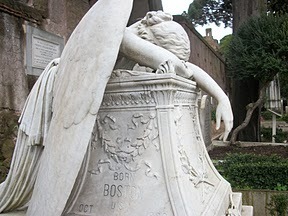
From Rome
I write for BitchBuzz, the global women's lifestyle network and my column for this week dealt with — among other things — the most spectacular writer meltdown in some time. You may have heard of or even participated in the Greek Seaman Incident as I like to call it (who can resist that name?). I liked Sally Quillford's take on the whole situation and how — bad as the author behaved — the need to pile on her after the point was made showed the worst in humans and especially writers and wannabe writers.
The truth is we all have to deal with rejection and the way you do that tells the world a lot about what kind of person you are — and tells publishers, editors and agents what kind of person you are to work with. It's a rare person who can take criticism without some bitterness. Throughout the ages writers have taken exception to those who found their work wanting:
What a blessed thing it is that nature, when she invented, manufactured and patented her authors, contrived to make critics out of the chips that were left! — Oliver Wendell Holmes
Writing is an occupation in which you have to keep proving your talent to those who have none. — Jules Renard
There is probably no hell for authors in the next world – they suffer so much from critics and publishers in this. — C. N. Bovee
You need to be able to take criticism in stride. That can be especially hard for new writers and particularly for women because we are taught to seek approval and often take it to heart when someone coldly rejects the manuscript we've been working on for days, months or years. Fear of rejection keeps far too many authors from getting their words out where they belong. I know — I used to be one of them. I'd write and write and write — and put it all in a drawer.
Coward.
Like everything else in life, the more you do it, the easier it gets. Bradbury rule: start something, finish it, send it off, start something else. When the story comes back with a rejection, send it somewhere else and keep writing! You have to learn to take rejection not as an indication of personal failing but as a wrong address. Think of these wise words:
This manuscript of yours that has just come back from another editor is a precious package. Don't consider it rejected. Consider that you've addressed it 'to the editor who can appreciate my work' and it has simply come back stamped 'Not at this address'. Just keep looking for the right address. — Barbara Kingsolver
And rejection doesn't end with publication. No matter how well you write, you will get critics who do not like your work. Sometimes they will teach you useful things about your writing. Sometimes it will simply be a matter of taste. You can't always know the difference. Save your snark for your friends; don't complain on the 'net because the world is watching.
I decided some time ago that while I could be Elizabeth Bennet in private, I needed to be Jane in public. Be gracious in your dealings with people especially when they don't deserve it. You will impress everyone (though I can't guarantee you a Bingley). And just get on with your writing. That's what you need to do.
Pay no attention to what the critics say; no statue has ever been erected to a critic. – Jean Sibelius
[Why am I scrambling this Monday morning? Because I ran off yesterday to have lunch in NoHo with the QoE and May -- totally worth it :-)]
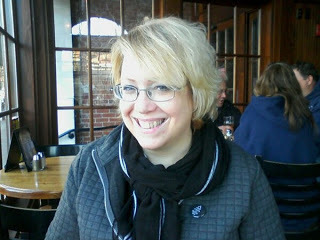

This is not a book that should be tossed lightly aside.
It should be hurled with great force.
– Dorothy Parker

From Rome
I write for BitchBuzz, the global women's lifestyle network and my column for this week dealt with — among other things — the most spectacular writer meltdown in some time. You may have heard of or even participated in the Greek Seaman Incident as I like to call it (who can resist that name?). I liked Sally Quillford's take on the whole situation and how — bad as the author behaved — the need to pile on her after the point was made showed the worst in humans and especially writers and wannabe writers.
The truth is we all have to deal with rejection and the way you do that tells the world a lot about what kind of person you are — and tells publishers, editors and agents what kind of person you are to work with. It's a rare person who can take criticism without some bitterness. Throughout the ages writers have taken exception to those who found their work wanting:
What a blessed thing it is that nature, when she invented, manufactured and patented her authors, contrived to make critics out of the chips that were left! — Oliver Wendell Holmes
Writing is an occupation in which you have to keep proving your talent to those who have none. — Jules Renard
There is probably no hell for authors in the next world – they suffer so much from critics and publishers in this. — C. N. Bovee
You need to be able to take criticism in stride. That can be especially hard for new writers and particularly for women because we are taught to seek approval and often take it to heart when someone coldly rejects the manuscript we've been working on for days, months or years. Fear of rejection keeps far too many authors from getting their words out where they belong. I know — I used to be one of them. I'd write and write and write — and put it all in a drawer.
Coward.
Like everything else in life, the more you do it, the easier it gets. Bradbury rule: start something, finish it, send it off, start something else. When the story comes back with a rejection, send it somewhere else and keep writing! You have to learn to take rejection not as an indication of personal failing but as a wrong address. Think of these wise words:
This manuscript of yours that has just come back from another editor is a precious package. Don't consider it rejected. Consider that you've addressed it 'to the editor who can appreciate my work' and it has simply come back stamped 'Not at this address'. Just keep looking for the right address. — Barbara Kingsolver
And rejection doesn't end with publication. No matter how well you write, you will get critics who do not like your work. Sometimes they will teach you useful things about your writing. Sometimes it will simply be a matter of taste. You can't always know the difference. Save your snark for your friends; don't complain on the 'net because the world is watching.
I decided some time ago that while I could be Elizabeth Bennet in private, I needed to be Jane in public. Be gracious in your dealings with people especially when they don't deserve it. You will impress everyone (though I can't guarantee you a Bingley). And just get on with your writing. That's what you need to do.
Pay no attention to what the critics say; no statue has ever been erected to a critic. – Jean Sibelius
[Why am I scrambling this Monday morning? Because I ran off yesterday to have lunch in NoHo with the QoE and May -- totally worth it :-)]

Published on April 04, 2011 05:38
April 2, 2011
BitchBuzz: Exploding on the Internet
So, yeah -- it's a bit late. The column I usually send in on Wednesday to appear on Thursday was there, unsent, Thursday late. I would say I can't believe I did that, but it's all too believable with the hectic way things are. I take it as a reminder to slow down and pay attention. Never a bad idea.
Rebecca Black, Fame, & Exploding in PublicBy K.A. Laity
 "Fame is a bee. / It has a song / It has a sting / Ah, too, it has a wing." - Emily Dickinson
"Fame is a bee. / It has a song / It has a sting / Ah, too, it has a wing." - Emily Dickinson
There have been a couple of instructive internet memes this past week: Rebecca Black and The Greek Seaman. The former is a 13-year-old with well-to-do parents who paid for a professionally recorded music video, the latter a novice writer who attacked a reviewer who did not like her book. The two are seemingly unrelated but for the internet sensation they became, but if we dig a little further we will find some unsettling parallels.
You may count yourself lucky if you didn't get a friend on Facebook linking to "The Worst Music Video Ever" and asking for you to watch it and agree. First, it's not the worst ever (there is so much competition, but a rough internet agreement seems to have settled on Armi &Danni's "I Wanna Love you Tender"). Further, it's surely not any more (or less) annoying that Justin Bieber or a host of other teen sensations. I quizzed my students on why they thought Black was so much worse than any other but they simply shrugged and put it down to fatigue with Autotuned pop music. A valid point, but I think that's a tipping point we reached some time ago...
Read the rest at BBHQ.
Rebecca Black, Fame, & Exploding in PublicBy K.A. Laity
 "Fame is a bee. / It has a song / It has a sting / Ah, too, it has a wing." - Emily Dickinson
"Fame is a bee. / It has a song / It has a sting / Ah, too, it has a wing." - Emily Dickinson
There have been a couple of instructive internet memes this past week: Rebecca Black and The Greek Seaman. The former is a 13-year-old with well-to-do parents who paid for a professionally recorded music video, the latter a novice writer who attacked a reviewer who did not like her book. The two are seemingly unrelated but for the internet sensation they became, but if we dig a little further we will find some unsettling parallels.
You may count yourself lucky if you didn't get a friend on Facebook linking to "The Worst Music Video Ever" and asking for you to watch it and agree. First, it's not the worst ever (there is so much competition, but a rough internet agreement seems to have settled on Armi &Danni's "I Wanna Love you Tender"). Further, it's surely not any more (or less) annoying that Justin Bieber or a host of other teen sensations. I quizzed my students on why they thought Black was so much worse than any other but they simply shrugged and put it down to fatigue with Autotuned pop music. A valid point, but I think that's a tipping point we reached some time ago...
Read the rest at BBHQ.
Published on April 02, 2011 04:07
April 1, 2011
Friday's Forgotten Books: The Pillow Book of Eleanor Bron
I'm glad to put the March madness behind me, but as it's April Fools' Day, I'll not trust that things are any less insane. No column yesterday because as I discovered last night, I forgot to send it -- d'oh! Maybe it'll be up later today. That's just how it's been. Some of the madness is good: keep your fingers crossed.
Publication: Check out my faux Lear in the April issue of Asinine Poetry and "like" it if so inclined. See also my "hack" bio. The editor writes:
Ms. K.A. Laity is capable as few poets are of a nubile, incessant verse that wears its pants lightly. Her poetics do not hold to some center, but instead bounce around the space in a vain effort to catch the laser point of reason.
High praise, eh -- er, something...
Don't forget to peruse the other offerings of overlooked books at Patti Abbott's blog.
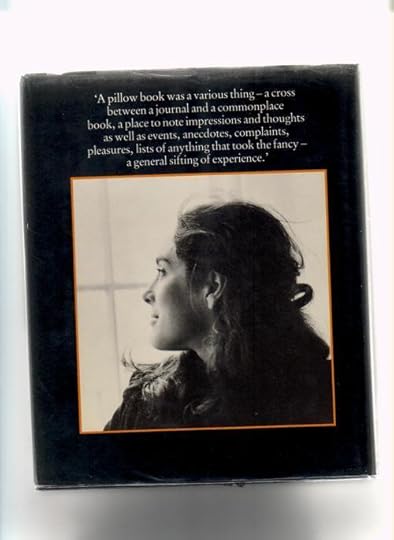 FFB: THE PILLOW BOOK OF ELEANOR BRON
FFB: THE PILLOW BOOK OF ELEANOR BRON
First, massive thanks to Todd for getting me this. We had nearly given up on it arriving and then at last it did. It's a hard to find book, which is a travesty. You doubtless know Bron if only from my mentions of her with my idol Peter Cook or in the Beatles' Help! or of course as Patsy's mother in AbFab.
What you may not know is that she is a crisply intelligent observer and witty self-deflating writer. Working with lionized men like Cook, Moore, Miller and Bennett in Beyond the Fringe and of course, The Beatles, Bron often finds herself on the fringes of the excitement and ignored. Yet she never seems resentful although frequently amused and always sharply observant. Here she is on flying to Nassau with the Fab Four to film the tropical sections of Help!:
I was not prepared for the noise when we walked out onto the tarmac. It was Trafalgar Square with the volume up, beyond imagination -- the sound of millions of starlings startled into the air, But the starlings were girls, when I looked back, very very young ones, who covered the airport buildings. Wherever you could see, wherever they could see, wherever they were allowed, and elsewhere, oozing and easing themselves in where they were not; waving banners and arms, pushing and heaving, in great danger I imagine of falling over edges, wriggling and ceaselessly squealing -- a high sighing hopeless poignant sound, unrequitable.
She reprints a letter from EM Forster who says he's looking forward to seeing her in the dramatic adaptation of Howard's End. Bron makes little lists, "poignant things" or "disappointing things" or "remarkable things":
-- my mother's total lack of vanity
-- my father's sense of fairness
The glamourous world of show business, which she seems nonplussed to find herself immersed in, gets treated with an explorer's eye of discovery and sometimes a dazzled look of amazement. The whole of this book is delightful and I long to sit down to tea with Bron and just talk for hours. Sigh.
Publication: Check out my faux Lear in the April issue of Asinine Poetry and "like" it if so inclined. See also my "hack" bio. The editor writes:
Ms. K.A. Laity is capable as few poets are of a nubile, incessant verse that wears its pants lightly. Her poetics do not hold to some center, but instead bounce around the space in a vain effort to catch the laser point of reason.
High praise, eh -- er, something...
Don't forget to peruse the other offerings of overlooked books at Patti Abbott's blog.
 FFB: THE PILLOW BOOK OF ELEANOR BRON
FFB: THE PILLOW BOOK OF ELEANOR BRONFirst, massive thanks to Todd for getting me this. We had nearly given up on it arriving and then at last it did. It's a hard to find book, which is a travesty. You doubtless know Bron if only from my mentions of her with my idol Peter Cook or in the Beatles' Help! or of course as Patsy's mother in AbFab.
What you may not know is that she is a crisply intelligent observer and witty self-deflating writer. Working with lionized men like Cook, Moore, Miller and Bennett in Beyond the Fringe and of course, The Beatles, Bron often finds herself on the fringes of the excitement and ignored. Yet she never seems resentful although frequently amused and always sharply observant. Here she is on flying to Nassau with the Fab Four to film the tropical sections of Help!:
I was not prepared for the noise when we walked out onto the tarmac. It was Trafalgar Square with the volume up, beyond imagination -- the sound of millions of starlings startled into the air, But the starlings were girls, when I looked back, very very young ones, who covered the airport buildings. Wherever you could see, wherever they could see, wherever they were allowed, and elsewhere, oozing and easing themselves in where they were not; waving banners and arms, pushing and heaving, in great danger I imagine of falling over edges, wriggling and ceaselessly squealing -- a high sighing hopeless poignant sound, unrequitable.
She reprints a letter from EM Forster who says he's looking forward to seeing her in the dramatic adaptation of Howard's End. Bron makes little lists, "poignant things" or "disappointing things" or "remarkable things":
-- my mother's total lack of vanity
-- my father's sense of fairness
The glamourous world of show business, which she seems nonplussed to find herself immersed in, gets treated with an explorer's eye of discovery and sometimes a dazzled look of amazement. The whole of this book is delightful and I long to sit down to tea with Bron and just talk for hours. Sigh.
Published on April 01, 2011 07:03
March 30, 2011
Reading: Lumottu
I am very pleased to announce that my play Lumottu will receive a fully cast reading at the Arts Society of Kingston on May 31st. Casting will commence soon. As they make clear on the website, "These are workshops rather than productions, whose focus is on process, not product. It is the hope of the Lab that playwrights will listen to all feedback without defending or explaining their work, then sift through the feedback at their leisure. In the end, only the playwright can decide what feedback to use or lose."
The name of the play is the Finnish word for "enchanted" and it explores the power of myth for people in difficult situations. Here's the description they're using for mailings:
Arja lives with one foot in this world and the other in the mythic world of ancient Finland. Her family has moved to the new world, but the old world's magic clings to their lives — and deaths.
Sound intriguing? I hope so. This play first jumped from my head Athena-like when I was on the boat in Lake Saimaa heading out to see the ancient rock paintings. I saw it as a performance: a woman dressed as Louhi with her eagle wings behind a girl who was telling the story. It's wonderful to have this one step closer to realising that image.

The name of the play is the Finnish word for "enchanted" and it explores the power of myth for people in difficult situations. Here's the description they're using for mailings:
Arja lives with one foot in this world and the other in the mythic world of ancient Finland. Her family has moved to the new world, but the old world's magic clings to their lives — and deaths.
Sound intriguing? I hope so. This play first jumped from my head Athena-like when I was on the boat in Lake Saimaa heading out to see the ancient rock paintings. I saw it as a performance: a woman dressed as Louhi with her eagle wings behind a girl who was telling the story. It's wonderful to have this one step closer to realising that image.
Published on March 30, 2011 06:20
March 29, 2011
Tuesday's Overlooked Films: The Tempest
First a quick link: I am the featured writer interview in the latest Text Novel newsletter: "The world is my bison." :-) TextNovel is one of the places that
The Mangrove Legacy
appeared before its publication and of course, the new serial
Airships and Alchemy
can be found there as well as on the serial blog. And if you want to know how to pronounce the word, see here.
Be sure to see the round up of all the overlooked films over at Todd's blog.
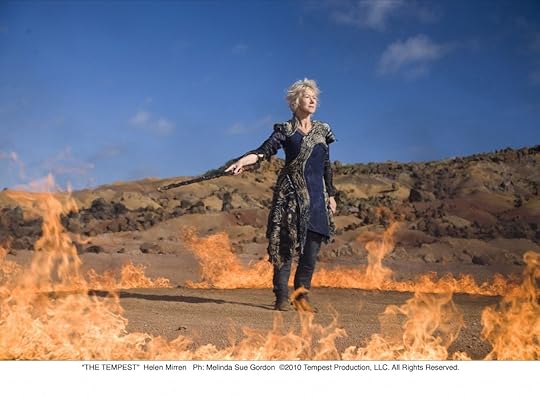 I love Julie Taymor's vision: she has an imagination that sings and flies and creates some amazing visions. How, you ask, how could her film of Shakespeare's wondrous Tempest, the most magical of all his plays, fail?
I love Julie Taymor's vision: she has an imagination that sings and flies and creates some amazing visions. How, you ask, how could her film of Shakespeare's wondrous Tempest, the most magical of all his plays, fail?
Simple: bad CGI.
Unconvincing, twee and hokey CGI. Cringe-worthy! We don't need to see Ben Wishaw's (digitally unsexed) Ariel duplicate like a badly loading JPEG. Almost none of the CGI is good: almost none of it is necessary.
Because the rest of the film is wonderful. Helen Mirren makes a glorious Prospera. Every minute the camera focuses on her becomes completely captivating. Glorious: it's the only word that works. Sally Potter offers another stunning wardrobe -- I want ALL of Helen Mirren's clothes (especially the one above). There's a great cast: how can you go wrong with Tom Conti, David Straitharn, Chris Cooper, Alfred Molina, Alan Cumming? Felicity Jones makes for an irresistible Miranda and Reeve Carney provides an adequate Ferdinand (a lousy part: there's little for him to do in any version of the play) looking golden and mooning after Miranda. Djimon Hounsou gives us a Caliban of the earth, who seems to have sprung from its depths like a mudman, his Butoh-inspired movement making him visually Other as much as his strange exterior and race. Wishaw embodies Ariel with some CGI enhancement, which I think doesn't give him enough credit for the way his acting as Ariel must shift gender and aspect so often. When clothed in black wings as the harpy, he's magnificent.
So forget the bad CGI: see this film anyway. It's worth it for Mirren alone, and there is so much more besides. Peg and I were talking about this on the way back; maybe Taymor just doesn't care about the CGI being good. But audiences now want it to look seamless. We saw this at Upstate Films in Rhinebeck which was a terrific theatre except for the fact that they turned up the house lights the second the credits began. The credits in this film are a piece: Portishead's Beth Gibbons sings Prospera's final speech wit Elliot Goldenthal's music and it's quite wonderful.
Be sure to see the round up of all the overlooked films over at Todd's blog.
 I love Julie Taymor's vision: she has an imagination that sings and flies and creates some amazing visions. How, you ask, how could her film of Shakespeare's wondrous Tempest, the most magical of all his plays, fail?
I love Julie Taymor's vision: she has an imagination that sings and flies and creates some amazing visions. How, you ask, how could her film of Shakespeare's wondrous Tempest, the most magical of all his plays, fail?Simple: bad CGI.
Unconvincing, twee and hokey CGI. Cringe-worthy! We don't need to see Ben Wishaw's (digitally unsexed) Ariel duplicate like a badly loading JPEG. Almost none of the CGI is good: almost none of it is necessary.
Because the rest of the film is wonderful. Helen Mirren makes a glorious Prospera. Every minute the camera focuses on her becomes completely captivating. Glorious: it's the only word that works. Sally Potter offers another stunning wardrobe -- I want ALL of Helen Mirren's clothes (especially the one above). There's a great cast: how can you go wrong with Tom Conti, David Straitharn, Chris Cooper, Alfred Molina, Alan Cumming? Felicity Jones makes for an irresistible Miranda and Reeve Carney provides an adequate Ferdinand (a lousy part: there's little for him to do in any version of the play) looking golden and mooning after Miranda. Djimon Hounsou gives us a Caliban of the earth, who seems to have sprung from its depths like a mudman, his Butoh-inspired movement making him visually Other as much as his strange exterior and race. Wishaw embodies Ariel with some CGI enhancement, which I think doesn't give him enough credit for the way his acting as Ariel must shift gender and aspect so often. When clothed in black wings as the harpy, he's magnificent.
So forget the bad CGI: see this film anyway. It's worth it for Mirren alone, and there is so much more besides. Peg and I were talking about this on the way back; maybe Taymor just doesn't care about the CGI being good. But audiences now want it to look seamless. We saw this at Upstate Films in Rhinebeck which was a terrific theatre except for the fact that they turned up the house lights the second the credits began. The credits in this film are a piece: Portishead's Beth Gibbons sings Prospera's final speech wit Elliot Goldenthal's music and it's quite wonderful.
Published on March 29, 2011 08:14
March 28, 2011
Rome: Street Art
One of the things I always find myself snapping while I travel is street art and graffiti. I know it doesn't appeal to everyone and some people find it destructive and annoying. A lot of it is truly ugly, but with the rise of artists like Banksy, Shepard Fairey and SWOON, people (sometimes grudgingly) give it credit. I saw an Invader mosaic as we were driving through Trastevere and I wondered if it were authentic.
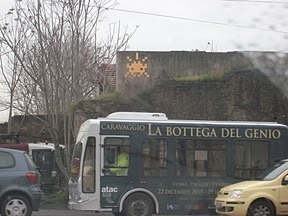
From Rome
Turns out Invader had just had a show in Rome and had gone around putting up mosaics around the city. I didn't get a picture of the one by the Museum of Modern Art, but I did get this one at the top of the Spanish Steps.
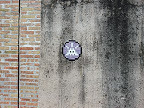
From Rome
I love the mash-up nature of a lot of street art: you can combine anything and see the parts in a new whole. This artist uses the tag "hogre" it seems.
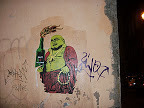
From Rome
In the ancient living history that is the Coliseum, people still want to leave their mark.
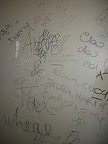
From Rome
We were intrigued by posters with enigmatic messages when we went out to dinner in Trastevere. I remembered to look for some clues online and found this was part of an exhibit by Jeremy Mende called "100 Years from Now" which looks back to the Italian Futurist movement about a century later. The Futurists fascinate me -- and always make me want to write manifestos. There was a terrific Futurist exhibit at the Tate Mod not long ago, which I really enjoyed.
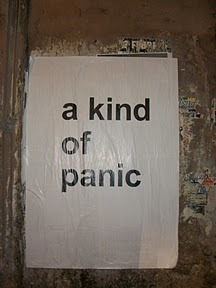
From Rome
And of course I was welcomed to Rome with some very heartfelt art: Thanks, Edo!
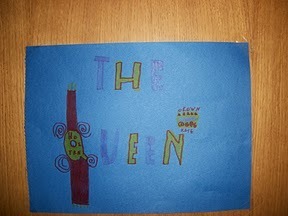
From Rome


From Rome
Turns out Invader had just had a show in Rome and had gone around putting up mosaics around the city. I didn't get a picture of the one by the Museum of Modern Art, but I did get this one at the top of the Spanish Steps.

From Rome
I love the mash-up nature of a lot of street art: you can combine anything and see the parts in a new whole. This artist uses the tag "hogre" it seems.

From Rome
In the ancient living history that is the Coliseum, people still want to leave their mark.

From Rome
We were intrigued by posters with enigmatic messages when we went out to dinner in Trastevere. I remembered to look for some clues online and found this was part of an exhibit by Jeremy Mende called "100 Years from Now" which looks back to the Italian Futurist movement about a century later. The Futurists fascinate me -- and always make me want to write manifestos. There was a terrific Futurist exhibit at the Tate Mod not long ago, which I really enjoyed.

From Rome
And of course I was welcomed to Rome with some very heartfelt art: Thanks, Edo!

From Rome
Published on March 28, 2011 06:05
March 25, 2011
Soundcloud

A new way to spread sound -- well, newish. It's been getting a boost, mostly via other social media outlets and DJs. Of course now that people like me are starting to use it, the DJs are looking for something new. Way to suck the cool out, eh?
My page at Soundcloud features things you might have heard before: a couple of the conceits and an early reading of "Rothko Red." I got a new digital recorder, so I'm going to put more things up with luck a little more regularly. Maybe even some music...
Yes, still working on getting the Rome photos online. A good number added since you last looked. I'll tell more about my adventures when I get a moment. Still catching up from being gone and working on a million and one things. Life may slow down a little by, oh let's see -- May?
Published on March 25, 2011 08:10
March 24, 2011
BitchBuzz: Why Elizabeth Taylor Mattered
My column pays tribute to the luminous Ms. Taylor; I want to sit down and enjoy Who's Afraid of Virginia Woolf? with some friends. Such a good and harrowing film! I altered the last line of my bio as a nod to the movie :-)
Why Elizabeth Taylor MatteredBy K.A. Laity I don't think President Bush is doing anything at all about AIDS. In fact, I'm not sure he even knows how to spell AIDS. - Elizabeth Taylor
I don't think President Bush is doing anything at all about AIDS. In fact, I'm not sure he even knows how to spell AIDS. - Elizabeth Taylor
Accolades abound upon hearing the news that Dame Elizabeth Taylor has died at the age of 79. The most common theme seems to be that she was the last of Hollywood's glittering stars, rocking the old school glamour. From her dewy-eyed youth as the doomed Helen Burns in Jane Eyre and of course the allegedly-boyish National Velvet to her seven tempestuous marriages and her rock star lifestyle, the camera loved her luminous face.
But there was much more to the star as she ably demonstrated in her finest film role: Edward Albee's W ho's Afraid of Viriginia Woolf? where Taylor transformed into the foul-mouthed Martha to duke it out verbally with the love of her life, Richard Burton, as the hapless yet vicious George. Under all the glamour, she was one tough broad who didn't get enough credit for her accomplishments and her loyalty.
Read the rest: http://culture.bitchbuzz.com/why-elizabeth-taylor-mattered.html#ixzz1HWRijjbK
Still working at getting the photos up: bit by bit they're getting there. I'm adding captions as I go along so you can know where things are. Oodles of things to do in the meantime. It never ends!
Why Elizabeth Taylor MatteredBy K.A. Laity
 I don't think President Bush is doing anything at all about AIDS. In fact, I'm not sure he even knows how to spell AIDS. - Elizabeth Taylor
I don't think President Bush is doing anything at all about AIDS. In fact, I'm not sure he even knows how to spell AIDS. - Elizabeth Taylor
Accolades abound upon hearing the news that Dame Elizabeth Taylor has died at the age of 79. The most common theme seems to be that she was the last of Hollywood's glittering stars, rocking the old school glamour. From her dewy-eyed youth as the doomed Helen Burns in Jane Eyre and of course the allegedly-boyish National Velvet to her seven tempestuous marriages and her rock star lifestyle, the camera loved her luminous face.
But there was much more to the star as she ably demonstrated in her finest film role: Edward Albee's W ho's Afraid of Viriginia Woolf? where Taylor transformed into the foul-mouthed Martha to duke it out verbally with the love of her life, Richard Burton, as the hapless yet vicious George. Under all the glamour, she was one tough broad who didn't get enough credit for her accomplishments and her loyalty.
Read the rest: http://culture.bitchbuzz.com/why-elizabeth-taylor-mattered.html#ixzz1HWRijjbK
Still working at getting the photos up: bit by bit they're getting there. I'm adding captions as I go along so you can know where things are. Oodles of things to do in the meantime. It never ends!
Published on March 24, 2011 06:31
March 23, 2011
Rome: Pretty as a Picture
I've just begun to add the pictures: the process turns out to be a slow one, by means of the travel computer, mostly because I have to keep trying to clear memory on it. Then I have to upload pictures one at a time because I can't use up memory by downloading the little helper program. But slowly and surely, they're getting there! Take a look at the slideshow and enjoy a little armchair travel. If you click in the middle of the picture, it should open up full size in another page.
Published on March 23, 2011 16:00
March 22, 2011
Caravaggios, Artichokes and Agnes' Skull
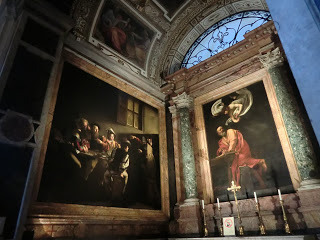 First off I have to say this is Alessandra's photo. I tried to get the pictures off the camera and onto my travel computer only to find that it overloaded the memory and now I can't upload them to the web. Argh. So kind thanks to Alessandra and she's started writing a blog, so you should check it out :-)
First off I have to say this is Alessandra's photo. I tried to get the pictures off the camera and onto my travel computer only to find that it overloaded the memory and now I can't upload them to the web. Argh. So kind thanks to Alessandra and she's started writing a blog, so you should check it out :-)On the second day, we wandered down to the Jewish Ghetto area where the Theatre of Marcellus can be found as well as the fabulous restaurants with giant displays of artichokes. The roasted artichoke we had with lunch was so good! I can still taste it, mmm. All the food was good, but I have generally thought of artichokes as far too much work to be worth it, but this inspired me to make one when I got home. Nowhere as good, but still tasty. My favourite fountain, the tortoise one, is near here.
The amazing thing about the Caravaggios in Rome is that so many of them are where they were intended to be: in churches. Small churches -- dark chapels in the small churches! The Basilica di Sant'Agostino and the Church of San Luigi dei Francesi that day. When you walk in the church you can always tell where the Caravaggios are because there's a knot of people all staring up. To light up the space there's usually a little box for you to throw your euros in and then the light comes back, so it's a amusing to watch the mini-drama each time the light goes out. Who will be the first to put a coin in the box?
What can I say about the paintings? To see Caravaggios where they were meant to be, to contemplate them in baroque churches that were chock full of gold and art and massive pillars and ornamentation? I always loved the line in Brideshead where Charles talks about being "insular and medieval" in his tastes and how Italy converted him to the Baroque. I won't say I've been converted, but I was certainly dazzled time and time again. One of the truly spectacular things about seeing Rome with Alessandra is that we could turn any corner and she would say, "oh, there's something you must see here." We would step inside a small stone church and suddenly a Baroque paradise! How were the Caravaggios? Indescribably awe inspiring. You'll just have to go to Rome and see for yourself.
We saw the Pantheon and marveled at how lovely it looks still -- as Michaelangelo said, "the work of angels not men." Then wandered over to the Piazza Navona, once a stadium for sports, home of an amazing Bernini fountain, Fontana dei Quattro Fiumi -- partly inspired by the artist's desire to show his superiority to his rival, Boromini, or so the story goes. The fabulous Palazzo Pamphili overlooks the piazza and it's also home to the Church of Sant'Agnese in Agone. Agnes' chapel was open, so we had the chance to peek at her little skull. Agnes was a popular figure in medieval martyrologies, patron of chastity and gardeners, always pictured with her little lamb. People wanted to touch her and feel some reflected glory -- the way that people want to grasp at celebrities now.
Published on March 22, 2011 12:43



